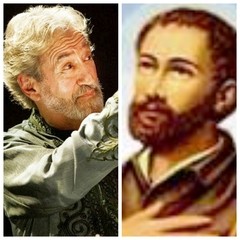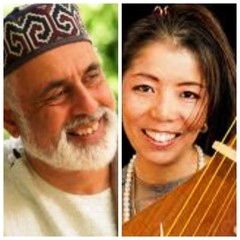|
Back
The Creations of The World New York
Lincoln Center, Alice Tully Hall
10/24/2019 -
“Francis Xavier’s Journey to the East (1506-1553”)
Traditional: Shino no netori – Reibo – Saltarello: Pavana del Re – Laïli djân – The Battle of Dan-no-Ura – Ave Maria
Pedro de Escobar: Virgen bendita sin par
Heinrich Issac: O Welt, ich muss dich lassen
Tylman Susato: Pavana “La Battaglia”
Claudin de Sermisy: Benedic anima mea
Fanfare: Pax in nomine Domini
Hymn: O gloriosa Domina
Mateo Flecha: San Sabeya, gugurumbé
Cristóbal de Morales: In Secundo Nocturno: Ne recorderis – Ad Matutinum: Circumdederunt me
Francisco de la Torre: Villancico: Adorámoste, Senor
John Douglas Thompson (Narrator)
Japan: Junko Ueda (Voice and Biwa), Ichiro Seki (Shakuhachi), Masako Hirao (Bass Viol), Hiroyuki Koinuma (Shinobue and Nokan); India: Prabhu Edouard (Tablas); Afghanistan: Daud Khan Sadozai (Sarod); La Capella Reial de Catalunya, Hespèrion XXI, Jordi Savall (Director, Founder, Tenor Viol, Conductor)

J. Savall/St. F. Xavier
At the climax of this, Jordi Savall’s most triumphant and iconic evening, one didn’t want to stand and applaud (as we all did). One wanted to shout “Amen” and “Blessings” and “Dayenu” and “Bahuta sā āśīrvāda”, and every other consecration in the world.
Actually every concert ever given by Mr. Savall has been a triumph, with various platforms of approachability. Iconic, though, is because the great Catalan instrumentalist, conductor, researcher and historian has, for over half a century attempted to bring together the wholeness of music. Not through a jejune motto or two (“Music is universal”). Not through a syncretic merger of two cultures like Lou Harrison. Or through stylized ethnicity, as Tan Dun did with his opera Marco Polo. Nor through sanctimonious lines about Moslems and Jews and Christians and atheists and Hindus.
But through deft research, and the almost impossible mind-set of both musicologist and artist.
Last night, he brought together the unlikely cultures of Afghanistan and India, Japan and Renaissance Europe in two hours without a single un-exciting moment.
The concept here was most unlikely: the life of the indefatigable 16th Century Jesuit missionary Francis Xavier. The Saint traveled through Europe, India and throughout Japan, dying of exhaustion at the age of 46. Mr. Savall could have used other early travelers as well. Marco Polo and Ibn Battuta, for instance. But with Xavier, he had the opportunity for the greatest early Renaissance music, as well as Indian and Japanese artistry.
All of them fitting hand in glove.
Theatrics there were, but they were held at a minimum. While the huge ensemble sat on stage, flutist Hiroyuki Konuma slowly came down the aisle with his flute blessings. (Just as he departed down another aisle at the end.). And yes, he combined the music of Japan, Afghanistan and Europe (see below), but so carefully that it became natural.
That fine actor John Douglas Thompson narrated the life of St. Francis, including his noble ideas about the Japanese people. But the real unity came from the music.
First, the motets, chants and even merry tunes from the Renaissance orchestra, Hespèrion XXI, led by Mr. Savall on tenor viol, with its consorts of cornets, shawm, sackbut, guitar, harp, organ, gorgeous percussion etc.
Equally essential was the six-man (er...including one anachronistic soprano) choral ensemble, La Capella Reial de Catalunya.
Now virtually all Renaissance choral groups are off-putting. They sing with reverence and spirituality and one smiles and listens and respects and attempts to stay awake. Mr. Savall’s ensemble performs the way they sung in the 16th Century, with vigor, with muscularity, with uninhibited volume and vitality. A joy to hear them throughout this whole evening.

D. K. Sadozai/J.Ueda
In between–and often with–the European music came the music of Japan and India. Most Westerners see Japanese costumes rather than hear the fluttering flutes and the Aeolian-harp-style strumming. Ichiro Seki’s shakuhachi bass flute was fine. Yet it was Junko Ueda strumming her biwa and singing of a great battle–with words translated on the screen–that one began to appreciate how the instrument gave a delicate–no, an Impressionistic–picture of the words.
The Afghani sarod player (now teaching music in Cologne) and French-Indian tabla player Prabhu Edouard gave an equally brilliant performance, but they also provided for this listener the equivalent of a epiphany.
This was it. As they played together, percussionist David Mayoral started to accompany them on his hand drum, with soft nuances. When they finished, in fact to their last notes, the choral/orchestral ensemble literally segued to their next piece which closed the first half.
At other times during this so wonderful evening, the Japanese, Afghan and Indian instruments joined the Western ensemble. Yet so delicately, so musically, so appropriately, that these groupings became not only unashamedly beautiful, but as an illustration of Jordi Savall’s whole life.
Several years ago, I wrote that Jordi Savall deserved, more than any others, the Nobel Peace Prize. Those awards are traditionally given to individuals who take an iniquitous situation and try to make it right again.
Mr. Savall takes the most beatific situation, human creativity, bringing humans to humanity itself. Unlike St. Francis Xavier, he is not a missionary, he doesn’t convert us to his leanings. Rather, Jordi Savall give us his art–which is the art of the world–and we are seduced, entertained, and in the most spiritual sense of the word, enlightened.
Harry Rolnick
|